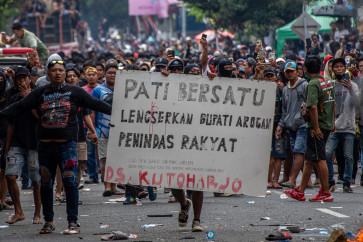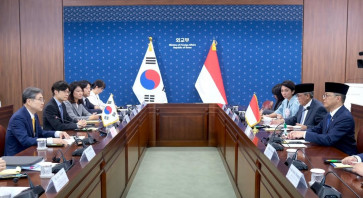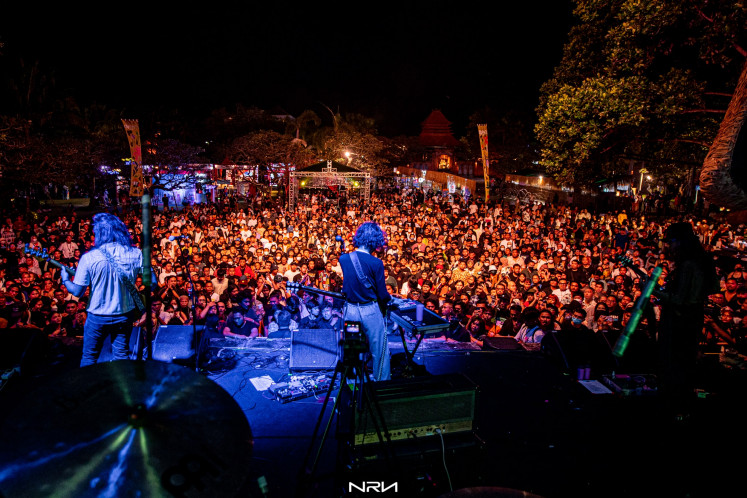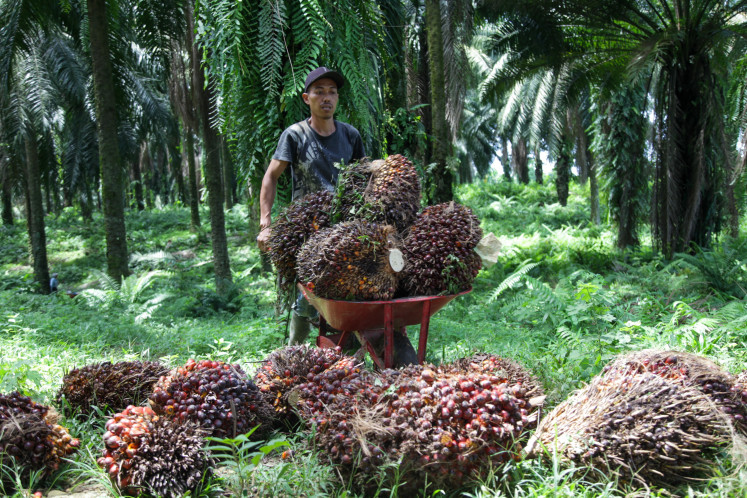Popular Reads
Top Results
Can't find what you're looking for?
View all search resultsPopular Reads
Top Results
Can't find what you're looking for?
View all search resultsHalal boom changes face of Indonesia’s cosmetics industry
With imports growing exponentially in the last couple of years, competing in Indonesia’s cosmetics market has been more challenging than ever for many domestic brands
Change text size
Gift Premium Articles
to Anyone
W
ith imports growing exponentially in the last couple of years, competing in Indonesia’s cosmetics market has been more challenging than ever for many domestic brands.
In 2018, imports of cosmetics amounted to US$850.15 million, up 34.5 percent from $631.66 million in the previous year.
However, amid greater diversity of cosmetic products and beauty trends these days, local brands apparently still hold a special place in consumers’ hearts.
According to data published by Sigma Research in 2017, 85 percent of Indonesia’s consumers still choose local skincare brands and 53 percent choose local makeup brands, especially for lipstick and face powder.
Similar results were found by a 2015 survey by Markplus Inc., which showed that 55 percent of 1,183 respondents favored local brands, such as Wardah, Viva, Sari Ayu and Mustika Ratu.
Among the local brands dominating the Indonesian market, none probably grew as fast as Wardah in the last five to 10 years.
Wardah, the first halal make-up business in Indonesia, has become the top-selling cosmetic product with a market share of more than 30 percent, according to Nielsen Company Indonesia.
Markplus Inc. said Wardah is the top pick among cosmetic brands in Indonesia, with 37.8 percent of the respondents choosing it as their favorite, far ahead of Pixy in second spot with 10.1 percent and Sari Ayu (8.7 percent) in third spot.
According to Harvard Business Review, Wardah has more than doubled its market share in the personal care category in Indonesia in the last five years. Wardah’s success is not only owed to its ability to meet the needs of Muslim women for makeup and skincare products tailored to local consumers’ skin type, but also because their products meet halal standards.
Marketing expert Yuswohady said the boom in nonfood and beverage brands introducing halal-certified products was a strategy to win the hearts of the huge Muslim market in Indonesia.
He said the Muslim market started in the early 2000s, when Indonesians were able to enjoy more freedom in expressing their culture and identity after the downfall of the New Order regime.
“People are gaining more freedom to express their culture and identity, including Muslims. Islamic-themed movies, TV series, music and fashion have started to become popular and are being celebrated as pop culture,” he said.
Yuswohady said the religiosity of Indonesian Muslims began to spread horizontally, not only vertically, or between humans and God. Horizontal religiosity affects how Muslims in Indonesia express their lifestyle based on sharia, or Islamic values.
“Now, Muslims are more concerned about what they wear, how to dress, what they eat, how they manage their finances, based on sharia. It is called sharia deepening,” he said.
Yuswohady added the fashion industry experienced the largest impact from this cultural shift around 2009 with the trend among Muslims to wear hijabs.
“Around that time, many celebrities began to wear the hijab. Then, the hijab started to be seen as a fashion statement and part of a lifestyle, not only part of religiousness,” he said, adding that fashion and cosmetics are inseparable so that when the hijab trend blossomed, Muslim women also started to look for halal cosmetics.
He conducted research in 2014 that showed that 95 percent of Indonesian Muslim women checked for a halal label before buying cosmetics.
A survey conducted by Sigma Research Indonesia in 2017 also showed that 58.3 percent of Indonesian women prefer to use halal cosmetics. They place greater emphasis on halal certification than on price, packaging, organic ingredients and other trends.
“Halal certification in cosmetics is very important, because what we put on our skin will be absorbed into our body. I also feel cosmetics that have halal certificates are safer,” beauty blogger Dian Kurnia Utami told The Jakarta Post.
Nurhayati Subakat, the founder of Paragon Technology and Innovation (PTI), which produces Wardah, said the company had the perfect timing to capitalize on the trend. “The hijab trend started in 2009, and I thank God for the perfect opportunity, because that was also the year we re-launched Wardah,” she said.
Nurhayati said Wardah’s growth was always above that of the cosmetics market, which in 2018 grew at around 17 percent. In some years, its growth even doubled that of the overall market.
Data from Euromonitor International’s InCosmetics Paris 2016 show Wardah as the sixth-fastest growing brand globally in 2014-2015. Wardah was the first Indonesian brand to enter this list.
Wardah’s positioning as a halal brand also comes with a downside. A survey conducted by Markplus Inc. shows that Wardah is less appealing in Hindu-majority Denpasar, Bali. It was favored by only 8.8 percent of the respondents there, defeated by other local brands, like Viva (31.6 percent) and Sari Ayu (17.5 percent). However, Wardah’s popularity is significantly higher in Banda Aceh, as 55.3 percent of female respondents call it their favorite cosmetics brand. (nal)










